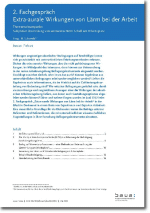An experimental investigation in the laboratory
- Project number : F 2427
- Institution : Federal Institute for Occupational Safety and Health (BAuA)
- Status : Completed Project
Description :
In this project, the effect of different occupational noise settings on reading performance, a concentration test, and the individual well-being was investigated in two empirical studies. All sound pressure levels were below the threshold for a hazard to the auditory system. Reading performance was chosen as one example relevant for work, since it is a day-to-day task in many fields to extract information from written material by reading. In total, 123 employees participated in the empirical studies. The age of the participants was between 29 and 65 years.
One essential goal in the first empirical study was to investigate, whether there is an increase in performance when the reading task is processed twice in the same acoustical condition. Such a training effect was observed when the task was processed twice in silence or twice in a condition with speech as background sound. The knowledge about the training effect is an important information for further studies with this task.
In the second empirical study, the effects of three different background sounds on the performance in the reading task and a concentration task were investigated in comparison to a silent condition. For this purpose, recordings from sounds at real work places were used, namely recordings from a multi-space office, from a checkout at a fashion retailer and from a construction site. (The sounds were provided by: J. Selzer, F. Schelle, Institut für Arbeitsschutz der DGUV, office und checkout; E. Parizet, Institut National des Sciences Appliquées de Lyon, construction site.) After working on the tasks, participants were asked for their subjective assessments regarding four different aspects (effort, concentration, performance, disturbance).
The analyses with respect to the reading task and the concentration task revealed isolated effects or at least trends, which demonstrated adverse effects of background sounds including spoken language (office, checkout). Distinct effects were found for the subjective assessments. On average, in all sound conditions the assessments showed higher effort, lower concentration, lower self-assessed performance and higher disturbance when working on the tasks with background sound in comparison to the silent condition.
Although the processing times for the tasks in this study were short (less than 20 minutes) in comparison to a full working day, adverse effects of the different noise conditions were observable. This is especially true for the subjective ratings, in which even for the sound without any speech (construction site) significant effects were found. This demonstrates the importance of asking people for their individual assessments. An extended form of questioning to determine individual ratings might actually be a useful instrument on its own. Subjective assessments should at least complement the measures taken from performance tests or other measures, in case that the goal would not only be to avoid drops in performance but also to provide a long-term protection from adverse effects linked to the acoustical environment at the work place.
